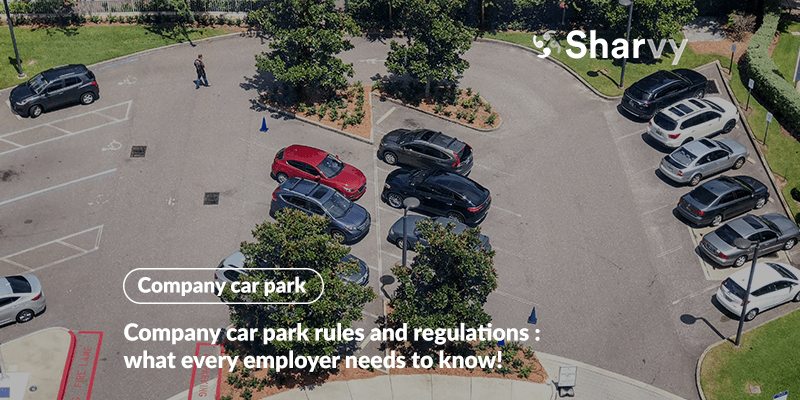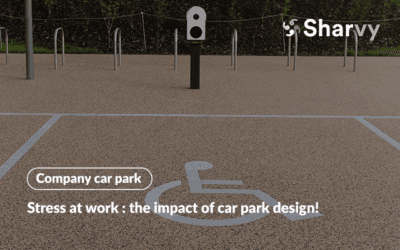Creating a company car park in the UK is no longer just about painting a few white lines and installing a barrier. These spaces are now a core part of the workplace environment, where safety, accessibility, and sustainability must go hand in hand.
Between the requirements of the Health and Safety Executive (HSE), the obligations under the Equality Act 2010, and the rise of electric mobility, businesses are required to design and manage their car parks according to increasingly stringent standards.
In this article, we will explore UK company car park rules and regulations and show how modern tools like Sharvy can simplify parking management.
1. Safety and risk prevention: an employer’s responsibility.
Under the Health and Safety at Work etc. Act 1974, employers are legally responsible for assessing and managing risks in company car parks. Failing to do so can result in accidents, injuries, or even legal consequences.
Key safety considerations include:
Traffic flow and pedestrian safety: Clearly marked lanes, pedestrian crossings, and speed limits help prevent collisions.
Lighting and visibility: Well-lit car parks reduce the risk of accidents, especially during early mornings or evenings.
Surface maintenance: Regular checks for potholes, slippery surfaces, or debris are essential.
Signage: Clear directional signs and warnings for potential hazards improve overall safety.
2. Accessibility and inclusion: the impact of the Equality Act 2010.
The Equality Act 2010 requires employers to provide equal access for all employees and visitors, including those with disabilities. Compliance goes beyond legal obligations : it reflects a company’s commitment to inclusion.
Employers should ensure:
Designated accessible spaces: These should be near entrances, clearly marked, and wide enough for manoeuvring.
Smooth pathways: Accessible routes from the car park to the building should be obstacle-free and well-lit.
Flexible allocation: Spaces should be adaptable to different employee needs.
With Sharvy, companies can offer pre-bookable accessible spaces, ensuring that employees with disabilities can reserve a parking space in advance. This eliminates uncertainty, avoids conflicts, and promotes a fair and inclusive environment.
3. Electric mobility: the Part S Revolution.
The shift to electric vehicles (EVs) is now a key part of UK building and environmental regulations. Under Part S of the Building Regulations, new and renovated non-residential buildings with more than ten parking spaces must:
Install at least one EV charging point.
Pre-wire 20% of spaces to enable future charging installation.
These rules help companies transition to sustainable mobility, reduce carbon emissions, and support employees who drive electric vehicles.
Sharvy supports this transition by allowing employees to reserve EV-enabled spaces, manage charging schedules, and ensure optimal use of EV infrastructure. Businesses can track usage data, plan expansions, and reduce underutilisation of expensive EV installations.
4. Efficient car park management.
Managing a company car park efficiently requires more than compliance. It’s about optimising space and reducing stress for staff. The Private Parking Code of Practice encourages businesses to:
Provide clear rules and signage for parking.
Ensure fair access and booking systems.
Implement transparent dispute resolution mechanisms.
Digital solutions like Sharvy make this easier by allowing:
Pre-booking of parking spaces for employees and visitors.
Real-time availability tracking to prevent congestion.
Automated reporting for management, ensuring optimal space usage.
By integrating a digital booking system, companies can save time, reduce frustration, and increase employee satisfaction, while staying compliant with regulations.
In conclusion
UK company car parks are no longer just functional spaces. They are strategic assets that affect safety, accessibility, sustainability, and operational efficiency. From HSE compliance and Equality Act obligations to EV readiness and digital booking solutions, businesses must modernise their car parks to stay compliant and support employees.
With tools like Sharvy, companies can simplify car park management, optimise space usage, and enhance the employee experience, making corporate car parks safer, more inclusive, and future-ready.
Got a question? Check out the following FAQ!
Is it mandatory to provide a car park for all employees?
No, UK law does not require companies to provide parking for every employee. However, offering well-managed parking improves staff satisfaction and retention. Legal obligations mainly concern safety, accessibility for disabled employees, and environmental compliance (EV readiness).
What are the benefits for a company in tracking car park usage data?
Analysing occupancy and usage helps identify peak times, underutilised spaces, and plan adjustments such as adding EV charging points or redesigning traffic flow. This data can also be used for internal audits or to demonstrate compliance with regulations to authorities.
What penalties can a company face if it does not comply with car park safety rules?
If safety standards are not met, companies can be held liable in the event of an accident in the car park. This may result in fines, legal action, or sanctions from the Health and Safety Executive (HSE). Regular risk assessments, clear signage, and appropriate safety measures are therefore essential to prevent accidents and demonstrate compliance.
Why is it important to have a company car park booking system?
A booking system, such as the one offered by Sharvy, allows businesses to better manage available spaces, especially in busy car parks. It reduces employee stress from searching for a space, minimises conflicts, and ensures that priority spots (accessible or EV) are available for those who need them. Additionally, a digital system provides data on parking usage, enabling optimisation and planning for future improvements.
Want to find out more? Check out our latest articles to stay up to date!
Company car park: what are the differences with & without a digital solution?
Why opt for a digital solution for your company car park? What are the benefits compared with traditional methods? Focus!
Stress at work : the impact of car park design!
How does company car park design affect workplace stress? Can it improve employees’ day-to-day well-being?
Fleet manager: the benefits of a parking management application.
How can a fleet manager improve car park management across company sites? The challenges & benefits of using a Parking Management app.
Subscribe to our newsletter!
PARKING & WORKPLACE MANAGEMENT SOLUTION
Car park management - Charging points monitoring - Desk booking - Booking by time slots
SUBSCRIBE TO THE NEWSLETTER
Receive the latest Parking & Workplace trends by email once a month.













